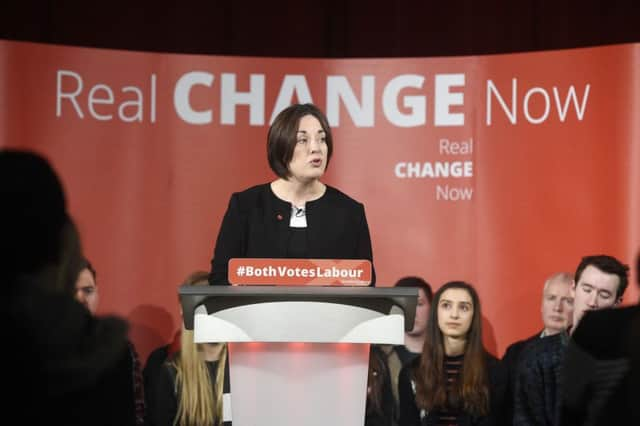Scottish Labour in turmoil as MP predicts end of Union


At the heart of the document will be a pledge by Kezia Dugdale to provide the £6,500 required per school to ensure that all primaries in Scotland can provide a Breakfast Club to give children a healthy meal first thing in the morning. But on the eve of the launch, the Conservatives claimed Ms Dugdale’s party was unable to hold the SNP to account on the constitution after a prominent Labour MP predicted Scotland would become independent.
The remark by Frank Field, MP for Birkenhead, came as it emerged that one of Ms Dugdale’s candidates had said Scottish Labour had to do “a lot of soul-searching” on whether to support independence.
Advertisement
Hide AdAdvertisement
Hide AdLabour’s constitutional position came under scrutiny when Mid Scotland and Fife candidate Mary Lockhart said she would be arguing for Labour to adopt a pro-independence position from within the party.
Mr Field made his view known when questioned on the BBC’s Daily Politics yesterday. Mr Field said: “I think Scotland is another country and I actually do think we will move to a position where you have independence. I hope we will then push for parliaments for all the countries, with England having a sovereign parliament like you [Scotland] have, and Wales and Northern Ireland.”
At a Women for Independence event, Ms Lockhart claimed 50 per cent or more of Labour’s traditional voters voted Yes in 2014, saying support for independence was strongest in the party’s traditional heartlands.
Her claim was made in response to an audience member who claimed some Labour MSPs who back independence, led to fresh calls for Ms Dugdale to explain her party’s position on the constitution.
Ms Lockhart said: “The Labour Party is going to have a lot of soul searching to do. Kezia Dugdale has already indicated she is comfortable for Labour members to campaign for a Yes vote in a referendum.”
The candidate went on to say that she had spoken with the deputy leader Alex Rowley about the constitution.
“I spoke with Alex Rowley about this last night and he said that he supported home rule,” Ms Lockhart said. “I asked for a clearer definition of home rule...Alex Rowley’s working of it out was a federal system of all the countries of Britain which might actually in the end include Ireland.” She then discussed what position the party might take after the election. She acknowledged that many had joined Labour during the referendum because they were of a Unionist persuasion. But then there had been those who joined as a result of the Jeremy Corbyn bandwagon. “Ironically, we’re relying on a re-influx of people who came in because of Corbyn but who support independence,” she said.
On whether Labour will support independence eventually, she added: “It will depend on who joins and who leaves after this election. I will still certainly be arguing for a campaign for independence within the Labour party. The party is unlikely this time to adopt a line. It won’t campaign for independence; it just won’t stop anybody else from doing so.”
Advertisement
Hide AdAdvertisement
Hide AdMs Lockhart’s comments led to Labour being urged to clarify its position by the Conservatives.
Conservative deputy leader Jackson Carlaw said: “Kezia Dugdale refused to say at the weekend whether or not Labour candidates were allowed to back independence. “Now we know why - while Scottish Labour claims to be the party of the union, its candidates are telling public meetings they support breaking it up.”
Policies for children contained in Labour’s manifesto will include a ‘Fair Start Fund’ from the 50p top rate of tax on those earning more than £150,000 a year to invest in cutting the attainment gap between the richest and rest in our classrooms Labour will pledge to protect education budget in real terms. Ms Dugdale will also unveil plans to reform the senior phase of school with a Scottish Graduation Certificate involving vocational courses, work experience and traditional exams. This would allow formal recognition for young people with fewer traditional qualifications.
Labour would also scrap charges for exam appeals and protect free university tuition. • An earlier version of this article incorrectly described Dr Frank Field as a ‘former Labour MP’, rather than a ‘former Labour minister’. We apologise for the error and for any confusion caused.